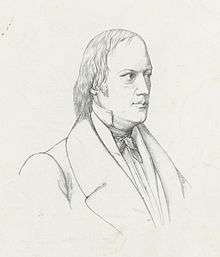Johann Nepomuk Schelble

Johann Nepomuk Schelble (16 May 1789 – 6 August 1837), was a German musician and composer.
Schelble was born in Hüfingen in the Black Forest. At the age of 18 he obtained a position as court and opera singer in Stuttgart, and having there begun the study of composition, he wrote an opera (Graf Adalbert) and other smaller pieces for voices or instruments; there too he was appointed teacher at the musical school of the city. Seven years later (1814), in order to perfect himself in his art, he went to Vienna, where he made the acquaintance of Beethoven. Among other of his compositions during his stay is a Missa solemnis for four voices and orchestra. Upon his arrival in Berlin in 1818, Clemens Brentano, with whom he had formed a friendship, procured him a place as first tenor in Frankfurt.
In this city he remained for the rest of his life, and there founded the Society of St. Cecilia, which worked to popularise classical music. He began by giving a weekly musical entertainment in his own house; these meetings were popular, and before long he was able to give them a permanent form under the title Cäcilienverein. Its members steadily increased in numbers: in 1818 he began with 21 members; in a few years there were a hundred. The first concert given was the Magic Flute of Mozart; soon followed works by Händel, Mozart, Haydn and Beethoven, and after 1828 those of Bach, and earlier composers such as Palestrina, Pergolesi, etc. In 1836 his health became impaired, and he returned to his native country to recuperate; but in vain. The following year he died. During his absence Felix Mendelssohn took his place as director of the society. Such was Mendelssohn's affection for him, that at the death of his (Mendelssohn's) father, he reportedly wrote to Schelble: "You are the only friend who after such a loss can fill the place of my father".
In 1831 Schelble commissioned Mendelssohn to write an Oratorio on behalf of the Society of St Cecilia. Mendelssohn chose as his subject St. Paul (oratorio)
References
![]() This article incorporates text from a publication now in the public domain: Herbermann, Charles, ed. (1913). "Johann Nepomuk Schelble". Catholic Encyclopedia. New York: Robert Appleton.
This article incorporates text from a publication now in the public domain: Herbermann, Charles, ed. (1913). "Johann Nepomuk Schelble". Catholic Encyclopedia. New York: Robert Appleton.